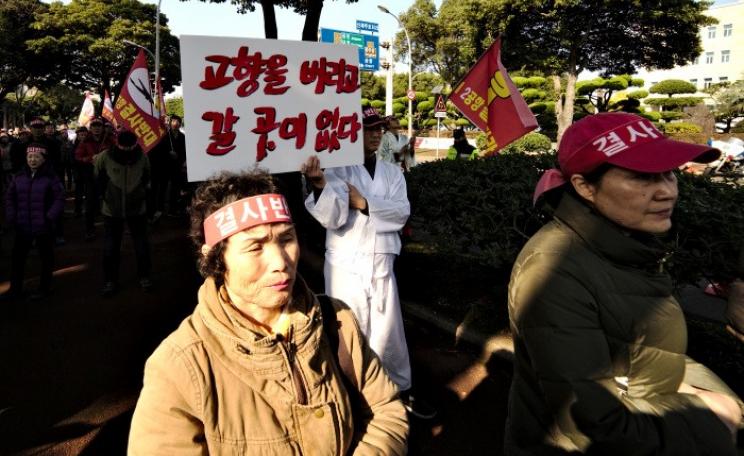The High Court ruled that forcible takeover of land for the airport, revocation of farmers' rights to their land, forcible entry into farmsteads, and destruction of crops, trees and buildings, were all 'unconstitutional, illegal, null and void'.
Farmers in Ekiti state in western Nigeria have just won a major legal victory in their resistance to a massive airport on their land.
A High Court judgment has been issued which upholds the farmers' land titles, awards them compensation, and injuncts the airport developers not to enter their land or harass or intimidate them.
But while the farmers are celebrating their achievement, they are also mourning the deaths of ten farmers who died in the course of the David and Goliath struggle.
The first many farmers even knew of the airport plan was on 2nd October 2015 when the Etiki state government sent in bulldozers to clear 4,000 hectares of farmland to make way for runways and terminals.
Bulldozers ripped down trees and destroyed farmland before compensation, for loss of land and livelihood, had been even discussed with affected farm owners.
The Nation Nigeria reported that State Governor Ayo Fayose was pursuing the project with such a "frenzy" that he had failed to even consult with farmers holding customary titles to the land.
An oil palm farmer whose plantation was bulldozed, Tijani Hakeem, died, reportedly of shock.
Land owners from the five villages affected - Igbemo, Igbogun, Aso Ayegunle, Ijan and Araromi Obbo - demanded compensation and to be relocated elsewhere. Produce cultivated on the land allocated to the airport had been their only source of livelihood, and the area also hosts sacred trees and a shrine.
The farmers' outcry succeeded in stalling the land clearance. On 13th October Governor Fayose announced that work on the airport would be suspended until December, promising to pay affected farmers compensation and grant them time to harvest their crops.
Fast-tracked by state governor, but widely opposed
The Ekiti airport project was top of the list of Governor Fayose's priorities and was being fast-tracked. He aimed for land clearing to be complete within a timescale of two months and said the airport must be constructed in the "shortest possible period".
As five bulldozers tore down trees Fayose said that all the road contractors in the state would be requested to lend the state at least one bulldozer to work on land clearing at the airport site for a month.
Bulldozing had commenced just a few weeks after the state government of Ekiti had announced that a committee has been established to "ensure the take-off" of an airport, in September 2015. At that stage it was stated that the project was to begin with construction of an airstrip and demarcation of 2,000 hectares of land, and a total of 6,000 hectares was allocated to the project.
The High Court ruled that forcible takeover of land for the airport, revocation of farmers' rights to their land, forcible entry into farmsteads, and destruction of crops, trees and buildings, were all 'unconstitutional, illegal, null and void'.
The airport project faced vocal opposition from within the state government. Former Speaker Femi Bamisile described pursuit of the project as a "misplaced priority" and a "criminal act", saying that the state government had inaugurated it without following due process and querying the tender for the project and where it was advertised.
The All Progressive Congress (APC) of Ekiti state criticised state funding for the airport, which would benefit the elite, at the expense of initiatives to support the growth of the local economy to support impoverished residents. The estimated project cost is $85.4 million, allocated for the airport in spite of Fayose's claim that the state has no money.
A former Senator, Gbenga Aluko, declared Ekiti Airport a waste of public funds, describing it as "economically unviable, unsustainable, unnecessary and ill-advised."
An APC spokesperson described the airport project as a "drain pipe to siphon money from Ekiti State treasury", and questioned the economic sense when an established airport, Akure, is underutilized, less than an hour's drive away, and located in a highly industrialized sate, whereas Ekiti is predominantly agrarian.
But the rationale for the airport is to open up Ekiti for development. Ironically, farmland was being destroyed for an airport that planners envisage will be utilized to export farm produce. The Speaker of the Ekiti State House of Assembly, Kola Oluwawole, stated his support for a cargo airport, to open up resources to exploration and to "ensure seamless exportation of agricultural products."
Farmers' resistance continued
Farmers continued their resistance to displacement for the airport. In December a group of affected farmers and landowners filed a suit, on behalf of themselves and others in the four affected communities, seeking damages for "unlawful and forcible acquisition" of their land, displacement, destruction of farm buildings and removal of their crops.
Their legal action also sought an injunction barring officials from further removal of or damage to their crops and buildings, and for the revocation of their rights to the land to be declared "unconstitutional, illegal, null and void".
Farmers stepped up their opposition to the airport with a protest. On 20th January 2016 a group of farmers stormed the project site and demanded that work cease immediately, in respect of the suit that they had filed.
They held placards with slogans reading: "Gov Fayose, Please Leave Us Alone, Don't Damage Our Life", "This Land Is The Major Cocoa Plantation, Please No Trespass", "Please Relocate Your Airport to Government Forest", "We All Say No To Illegal Airport Project", "Iwajo, Aso Say No To Illegal Airport", and "Igbogun Cries Over Illegal Destruction of Our Property".
Farmers said that government officials had entered their land and stolen produce including cocoa, yams and bananas. They also stated that at least ten farmers, including three women, had 'died of shock' caused by the destruction of their farms and ensuing economic loss.
'Mad rush for state airports'
All over Nigeria, similar plans for major new airports are vigorously opposed. On the day of the Ekiti protest an editorial on the AllAfrica news website, entitled Nigeria: No to New Airports, reported that governors of the states of Osun, Bayelsa, Abia, Ogun, Anambra, and Nasarawa were also building new airports, at enormous cost to citizens who suffered economic hardship and "against a wave of public discontent".
The article urged governors to redirect the funds lavished on new airports to infrastructure that would benefit ordinary people, to repair roads and bridges, and to invest in cottage industries rather than ill-conceived schemes to boost farmers' incomes by building cargo airports to export agricultural produce.
Punch magazine also slammed a "Mad rush for state airports", criticising state governments for embarking on wildly ambitious airport projects, while they neglect citizens' basic needs and fail to pay salaries and pensions, the country's dire economic situation rapidly worsening due to tumbling oil prices.
Claims that new airports will create jobs and generate revenue for government coffers are dubious in the light of waste of taxpayers' money to build and maintain several existing ‘white elephants'. Punch states that "the country's entire landscape is now dotted with odd assortments of abandoned and unviable airport projects."
All the states in which new airports are planned neighbour a state in which an airport already exists, in some cases as little as an hour's drive away from the site for the new airport. The Nation newspaper also reports that many of Nigeria's established airports are seriously underutilized: Delta, Akwa Ibom, Yola, Dutse, Birnin Kebbi, Bauchi and Katsina.
Expenditure on new airports is even more nonsensical when some existing airports lack vital infrastructure such as landing lights and fire and ambulance services. Bauchi Airport, inactive apart from charter flights, became an object of ridicule when passengers arriving on one aircraft had to disembark using a wooden ladder.
Farmers vindicated by court victory
In Ekiti, Governor Fayose appeared to be impervious to the rising chorus of criticism of his pet airport project. In February he continued to insist that the airport plan was both timely and meeting people's needs and pushed the project, vowing that the first plane would land on the tarmac by 2018.
But last month, on 22nd March, the farmers secured a major court victory. Their suit was successful and all their claims - against Governor Fayose, the state Commissioner for Works, Commissioner for Lands and Housing, and Attorney General and Commissioner for Justice - have been fully vindicated.
The high court in Ado-Ekiti ruled that forcible takeover of land for the airport project, revocation of farmers' rights to their parcels of land, forcible entry into farmsteads, and destruction of crops, trees and buildings on this land, were all - just as the farmers had petitioned - "unconstitutional, illegal, null and void".
Justice Dele Omotso also ordered that over $25,000 be paid to the farmers in damages and an injunction was granted restraining the defendants from forcibly entering the farmland and from harassing or intimidating the claimants. Ten Ekiti farmers have died due to a terrible trauma of injustice perpetrated by the state.
But the survivors have achieved a monumental legal victory, which serves as a beacon of hope for rural communities resisting land grabs for airports and other megaprojects.
Rose Bridger is a founder member of the Global Anti-Aerotropolis Movement (GAAM) and the author of Plane Truth: Aviation's Real Impact on People and the Environment, published by Pluto Press. Tweets at @RoseKBridger.
Facebook: Global Anti-Aerotropolis Movement.







